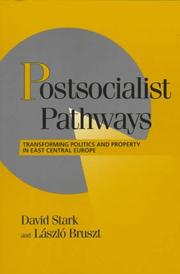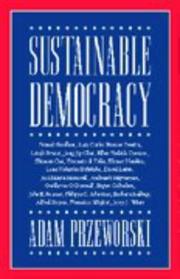| Listing 1 - 8 of 8 |
Sort by
|
Book
ISBN: 1489985271 0387893385 9786613560537 1280382627 0387893393 Year: 2009 Publisher: New York : Springer-Verlag,
Abstract | Keywords | Export | Availability | Bookmark
 Loading...
Loading...Choose an application
- Reference Manager
- EndNote
- RefWorks (Direct export to RefWorks)
Two decades after the fall of the Berlin Wall, we are witnessing an ever quickening dissolution of the boundaries between internal and external actors and the critical factors for understanding domestic institutional change. In the transnationalization of the economies of Western and Eastern Europe, international cross-ownership networks are playing a growing, and at times dominant role in domestic economies. These economies are governed by states that are increasingly sharing larger and larger parts of their regulative powers with non-domestic actors. These regulations are contested by civil societies that are increasingly based on networks of interlinked domestic and external NGOs. This is an emerging research agenda extending earlier research on transnationalization, which focused on the supra-national level, and it goes beyond the Europeanization literature that focused on externally induced or imposed change in domestic institutions. This book brings together in one volume the study of transnationalization in three institutional fields: civil society, state and the economy and extends the research of processes of transnationalization to evolving new democracies and emerging market economies. This book should be of interest to scholars and students in the field of political science, public policy, European studies, and international relations.
Europe, Eastern -- Economic integration. --- Europe, Eastern -- Economic policy. --- Europe, Eastern - Politics and government. --- European Union countries -- Foreign relations -- Europe, Eastern. --- Transnationalism -- Economic aspects -- Europe, Eastern. --- Transnationalism -- Social aspects -- Europe, Eastern. --- Transnationalism --- Immigration & Emigration --- Economic Theory --- Business & Economics --- Political Science --- Law, Politics & Government --- Economic aspects --- Social aspects --- International economic integration. --- Europe --- Economic integration. --- Economic policy. --- Common markets --- Economic integration, International --- Economic union --- Integration, International economic --- Markets, Common --- Union, Economic --- Political science. --- International relations. --- International economics. --- European Economic Community literature. --- Economics. --- International Economics. --- Economic Policy. --- International Relations. --- Political Science. --- European Integration. --- International economic relations --- European Economic Community lite. --- Administration --- Civil government --- Commonwealth, The --- Government --- Political theory --- Political thought --- Politics --- Science, Political --- Social sciences --- State, The --- Coexistence --- Foreign affairs --- Foreign policy --- Foreign relations --- Global governance --- Interdependence of nations --- International affairs --- Peaceful coexistence --- World order --- National security --- Sovereignty --- World politics --- Economic nationalism --- Economic planning --- National planning --- State planning --- Economics --- Planning --- Social policy --- Economic policy, Foreign --- Economic relations, Foreign --- Economics, International --- Foreign economic policy --- Foreign economic relations --- International economic policy --- International economics --- New international economic order --- Economic policy --- International relations --- Economic sanctions --- European Union countries --- Europe, Eastern --- Politics and government. --- EU countries --- Euroland
Book
ISBN: 9780387893396 9780387893389 Year: 2009 Publisher: New York Springer
Abstract | Keywords | Export | Availability | Bookmark
 Loading...
Loading...Choose an application
- Reference Manager
- EndNote
- RefWorks (Direct export to RefWorks)
International relations. Foreign policy --- International economic relations --- Public administration --- politieke wetenschappen --- economische politiek --- wereldeconomie --- internationale economie --- Europese eenmaking --- Europe --- Transnationalism --- 321.1 --- 332.9 --- 334.154.1 --- 338.753.2 --- 382.11 --- AA / International- internationaal --- EEC / European Union - EU -Europese Unie - Union Européenne - UE --- EEU / Central & Eastern Europe --- Trans-nationalism --- Transnational migration --- International relations --- Economic aspects --- Social aspects --- Theorie, ontstaan en evolutie van de staat --- Internationale organisatie, reglementering en wetgeving van de arbeid --- Verkeer van personen en goederen. vestiging van personen. Technische beperkingen. Vrijheid van beroep. Openbare markten. Europese eenheidsmarkt --- Elektrische energie --- Theorie van het internationale evenwicht. Economische onafhankelijkheid van een natie. Globalisering. Mondialisering --- European Union countries --- Europe, Eastern --- EU countries --- Euroland --- Foreign relations --- Economic integration. --- Economic policy. --- Politics and government.
Digital
ISBN: 9780387893396 9780387893389 Year: 2009 Publisher: New York, N.Y. Springer
Abstract | Keywords | Export | Availability | Bookmark
 Loading...
Loading...Choose an application
- Reference Manager
- EndNote
- RefWorks (Direct export to RefWorks)
International relations. Foreign policy --- International economic relations --- Public administration --- politieke wetenschappen --- economische politiek --- wereldeconomie --- internationale economie --- Europese eenmaking --- Europe

ISBN: 0521580358 0521589746 Year: 1998 Publisher: Cambridge [England] ; New York : Cambridge University Press,
Abstract | Keywords | Export | Availability | Bookmark
 Loading...
Loading...Choose an application
- Reference Manager
- EndNote
- RefWorks (Direct export to RefWorks)
Privatization --- Right of property --- Post-communism --- Privatisation --- Droit de propriété --- Postcommunisme --- Europe, Central --- Europe centrale --- Economic conditions. --- Politics and government --- Conditions économiques --- Politique et gouvernement --- Droit de propriété --- Conditions économiques --- -Postcommunism --- -Economic order --- Economic order --- Economic policy and planning (general) --- Eastern and Central Europe --- Ownership of property --- Private ownership of property, Right of --- Private property, Right of --- Property, Right of --- Property rights --- Right of private ownership of property --- Right of private property --- Right to property --- Law and legislation --- Civil rights --- Property
Book
ISBN: 9780387893396 Year: 2009 Publisher: New York, NY Springer-Verlag New York
Abstract | Keywords | Export | Availability | Bookmark
 Loading...
Loading...Choose an application
- Reference Manager
- EndNote
- RefWorks (Direct export to RefWorks)
Two decades after the fall of the Berlin Wall, we are witnessing an ever quickening dissolution of the boundaries between internal and external actors and the critical factors for understanding domestic institutional change. In the transnationalization of the economies of Western and Eastern Europe, international cross-ownership networks are playing a growing, and at times dominant role in domestic economies. These economies are governed by states that are increasingly sharing larger and larger parts of their regulative powers with non-domestic actors. These regulations are contested by civil societies that are increasingly based on networks of interlinked domestic and external NGOs. This is an emerging research agenda extending earlier research on transnationalization, which focused on the supra-national level, and it goes beyond the Europeanization literature that focused on externally induced or imposed change in domestic institutions. This book brings together in one volume the study of transnationalization in three institutional fields: civil society, state and the economy and extends the research of processes of transnationalization to evolving new democracies and emerging market economies. This book should be of interest to scholars and students in the field of political science, public policy, European studies, and international relations.
Politics --- Economic policy and planning (general) --- Foreign trade. International trade --- politieke wetenschappen --- economische politiek --- wereldeconomie --- internationale economie --- Europese eenmaking --- Europe
Book
ISBN: 0191772453 Year: 2014 Publisher: Oxford : Oxford University Press,
Abstract | Keywords | Export | Availability | Bookmark
 Loading...
Loading...Choose an application
- Reference Manager
- EndNote
- RefWorks (Direct export to RefWorks)
Emerging market countries are currently facing a dual challenge. How to incorporate transnational regulations into their societies, while building their own versions of regulatory capitalism. This raises a multitude of questions and challenges. Will the diffusion of international public and private regulations of developed countries, benefit a few and marginalize less developed countries? Or, can these regulations foster transnational public-private experiments to improve local regulatory capacities and social conditions?
Economic development --- International economic relations --- Business & Economics --- Economic Theory

ISBN: 0521483751 0521482615 0511664206 9780521483759 9780511664205 9780521482615 Year: 1995 Publisher: Cambridge Cambridge University Press
Abstract | Keywords | Export | Availability | Bookmark
 Loading...
Loading...Choose an application
- Reference Manager
- EndNote
- RefWorks (Direct export to RefWorks)
Sustainable Democracy is a joint report of twenty one social scientists, from eleven countries and four academic disciplines, who collaborated over the period of two years under the name of the Group on East-South Systems Transformations (ESST). Their report identifies the principal political and economic choices confronting new democracies in Southern and Eastern Europe and South America, while evaluating their merits and feasibility in the light of current social science knowledge. The scientists explore the social, political and economic conditions under which democracy is likely to generate desirable and politically desired objectives, as well as, whether it is likely to last. It is argued that the state has an essential role in promoting universal citizenship and in creating conditions for a sustained economic growth. Special emphasis is placed on the interdependence between political and economic reforms.
Postcommunisme --- Democracy --- Economic development --- Post-communism --- #SBIB:324H20 --- Postcommunism --- World politics --- Communism --- Case studies --- Politologie: theorieën (democratie, comparatieve studieën….) --- Political systems --- Case studies. --- Démocratie --- Développement économique --- Social Sciences --- Political Science --- Democracy - Case studies. --- Economic development - Case studies. --- Post-communism - Case studies.
Book

ISBN: 9781845459376 Year: 2009 Publisher: New York Oxford
Abstract | Keywords | Export | Availability | Bookmark
 Loading...
Loading...Choose an application
- Reference Manager
- EndNote
- RefWorks (Direct export to RefWorks)
| Listing 1 - 8 of 8 |
Sort by
|

 Search
Search Feedback
Feedback About UniCat
About UniCat  Help
Help News
News